Alabama AG discloses Alvin Bragg's true intention for prosecuting Trump
Reporters vied for seats in the briefing room, some even crouching on the floor. They all knew, on this Tuesday in early April 2023, that Alvin L. Bragg, the Manhattan district attorney, was about to announce something momentous: the first criminal charges against a former American president.
Yet when Bragg walked quietly onto the stage, it took a second or two for the audience to realize he was there. In his dark blue suit and dark-rimmed glasses, he blended into the dark blue curtains behind the lectern. He took out his notes and thanked everyone for coming. He was flanked by poster boards with flow charts, but that was as far as the showmanship went.
The accusations he went on to level against Donald J. Trump were salacious, involving money paid to a porn star just before the 2016 presidential election so she would remain silent about her claim that they had sex a decade before. But Bragg studiously avoided mentioning sex or hush money during the 13-minute event, focusing instead on 34 counts of falsifying business records to cover up the payment. Bragg looked frequently at his notes while he spoke, mostly in a monotone. He seemed unprepared (or unwilling) to answer the most obvious questions: why he had abandoned a different case, about whether Trump had falsified the valuations of properties, or why he thought he could make these new charges stick.
Bragg displayed passion only once, in response to a question about why he brought a hush-money case after his predecessor and federal prosecutors had not.
“This is the business capital of the world,” Bragg said, his voice rising. “We regularly do cases involving false business statements. The bedrock — in fact, the basis for business integrity and a well-functioning business marketplace — is true and accurate record-keeping. That’s the charge that’s brought here, falsifying New York State business records.”
True and accurate record-keeping. It’s hardly the stuff of history books. But a year later, it is this paperwork case — not the three other indictments that have dominated the news, involving accusations of trying to overturn a presidential election and mishandling highly classified documents — that will in the coming days make history as Trump’s first criminal trial, and perhaps the only one before the election in November.
Hardly anyone figured that it would play out this way. Bragg himself had said that “broader justice may warrant another case going first.” Yet with those other cases mired in legal skirmishing and delay, it is Bragg, a Harvard-trained prosecutor who has often appeared to be a most uncomfortable, un-media-savvy public figure, who will now face off against the reality-television star turned Republican former president, master of spin, media-ready insult and creation of his own narrative.
Bragg’s legal argument is complicated, but it stems from a simple episode: In the days before the 2016 election, Trump’s personal attorney and fixer, Michael D. Cohen, paid $130,000 in hush money to the adult-film star Stormy Daniels. Prosecutors argue that Trump, who denies that he had sex with Daniels, then lied on 34 business records — 12 ledger entries, 11 invoices and 11 checks — to disguise his repayment of Cohen as legal fees.
On its own, falsifying those documents would be misdemeanors, relatively minor crimes. Bragg elevated each of the charges to felonies by arguing that they were committed to hide or further another crime — which, in an unusual move, he did not charge. He said he wasn’t required to specify that crime, but added that it might have been a violation of state or federal election law. What may further complicate the case is that it relies heavily on testimony from Cohen, a disbarred lawyer who served prison time after pleading guilty to violating campaign-finance laws, evading taxes, making false statements to a bank and lying to Congress.
After the indictment, a chorus of critics — some but not all on the right — questioned the legal reasoning, wisdom and winnability of the hush-money case. Today, many experts believe that Bragg’s legal strategy looks considerably stronger, validated by a federal judge who rebuffed Trump’s effort to delay or even kill the case by having it moved to federal court, and by the Manhattan judge presiding over the case, who in February officially greenlit Bragg’s premise by setting a trial date.
None of which means the case has ceased to be controversial. The furor lives on, primarily in the political space. Trump and his allies have branded the case a witch hunt, a selective prosecution brought by a Democratic district attorney in the pocket of George Soros, boogeyman of the right. Many Democrats, in turn, worry that Trump’s narrative of persecution is only fueling his presidential campaign, especially because this case of sexual peccadillo and faked paperwork might look frivolous next to his three other indictments, which cut closer to his presidency and the foundations of American democracy.
“We’re all kind of like, ‘I can’t believe Alvin is at the center of this,’” says Erin E. Murphy, a New York University law professor who is part of Bragg’s close-knit friend group from law school and was one of more than 70 friends, colleagues and legal and political experts interviewed for this article. She adds: “He’s just so not political. He’s like, not a hyperpartisan political person in any way, shape or form. So there’s just this dissonance.”
Certainly, Bragg, who is 50, has never seemed to concern himself much with appearances. His friends have long joked about his wearing rumpled suits or a Boy Scout outfit on a date. If he could have applied for this job instead of campaigning for it, they say, he would have. That’s what he did when he became a federal prosecutor and then a deputy New York attorney general, each move a step forward in a life devoted to a careful, verging on nerdy, practice of the law; to the commitment to service — a word he has often used — that his parents instilled in him when he was growing up on Strivers’ Row in Harlem.
Bragg himself has seemed almost sheepish about the Trump case, preferring to talk about tackling wage theft or creating a jail-diversion program. Just after he announced the indictment last spring, his office sent out its regular roundup of big cases. It listed the Trump indictment not first, not even second, but third — after the convictions of two killers. The office’s 2023 highlights list didn’t even mention Trump. Bragg declined to comment for this article, concerned about being accused of unethical behavior before the trial.
Yet if Bragg the district attorney has been largely quiet about the former president, a look back through his record shows that hasn’t always been the case. Bragg the candidate, in fact, was more than willing to talk up his legal bona fides in the matter of Trump. Bragg may lack the polish and presentation of a politician. His friends may insist that he’s not a politician. But for all his lawyerly reticence, inside his sometimes-ill-fitting suits is a man of unmistakable ambition who has hitched his aspirations to the pursuit of Donald J. Trump.
-
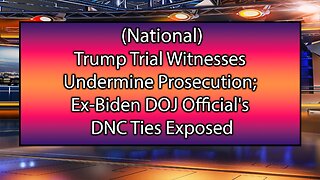 0:56
0:56
National News Shorts - Wamb 360 News
24 days agoTrump Trial Witnesses Undermine Prosecution; Ex-Biden DOJ Official's DNC Ties Exposed
64 -
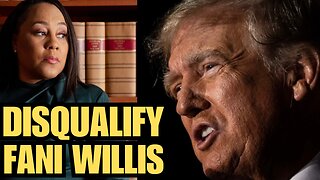 6:55
6:55
Grace2Freedom Videos
20 days agoTRUMP WIN! Fani Willis disqualification case gain momentum with Georgia appeal court grants hearing
70 -
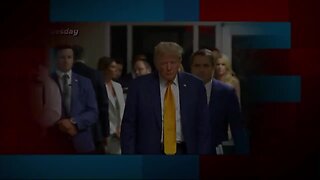 3:20
3:20
Grabien
19 days agoABC: Prosecutors Looking for Michael Cohen ‘To Complete Narrative and Pin Crime on Trump’
56 -
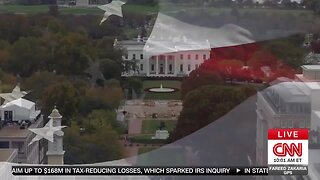 5:30
5:30
Grabien
19 days agoCNN’s Zakaria: NYC ‘Prosecutors Are Politically Motivated’ Against Trump
48 -
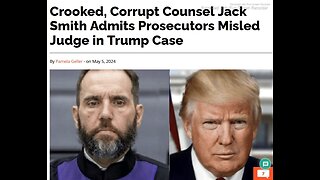 6:00
6:00
LEARN FROM HISTORY OR DOOMED TO REPEAT IT
23 days agoTEXT ARTICLE - CROOKED, CORRUPT COUNSEL JACK SMITH ADMITS PROSECUTORS MISLED JUDGE IN TRUMP CASE
100 -
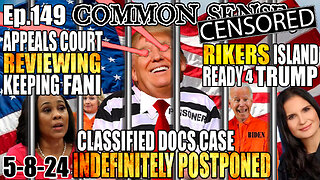 3:33:46
3:33:46
Common [CENSORED]: An America First Podcast
23 days agoEp.149 GA STATE ELECTIONS BOARD: DECERTIFY 2020 WIN! CLASSIFIED DOCS CASE INDEFINITELY SUSPENDED!
8361 -
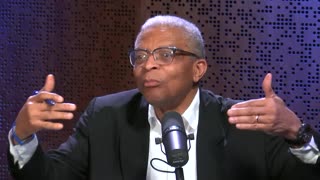 8:36
8:36
Rolling With You
24 days agoOfficialACLJ - TRUMP UPDATE: Jack Smith Admits to Evidence Tampering
1.77K -
 17:58
17:58
Barry Zalma, Inc. on Insurance Law
2 years agoAdvice of Counsel as a Defense to the Tort of Bad Faith
285 -
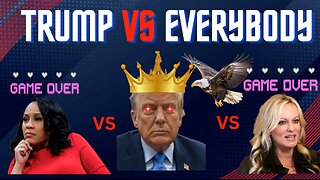 8:21
8:21
All Things Political
22 days agoTrump Is Winning All These Cases
852 -
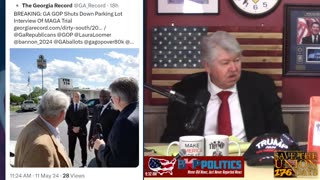 47:26
47:26
Voice Of Rural America
19 days agoThe GA GOP Inc Is All About 2026, Not Electing Trump As President In 2024
232